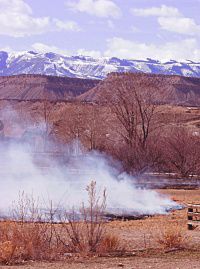| Controlled open fires in agricultural areas are allowed during late winter and early spring to enable Carbon County farmers to burn off old growth as well as clean ditch banks. But depending on where a controlled burn project is planned, a permit may be required. All open burns must be reported to the safety dispatch center before the fires are lit, regardless of whether a permit is required. |
Carbon County faces a dire water year unless the traditional weather patterns undergo significant changes.
The pending drought conditions affect everyone who has a lawn, plants a garden and operates a farm or ranch. But there is more at stake than a lack of water to raise tomatoes or keep baseball fields green.
State fire officials are considering ending the open burn season early in 2003. The closed burning period typically runs from about June 1 to Oct. 31. But due to extremely dry conditions, it appears the season will begin around the end of April.
In addition to state regulations, various local entities in the county have rules on the burning of materials.
For instance, incorporated Price does not allow outside burning – with one exception.
“There are two agricultural areas within the city limits and we allow them to burn their ditches and fields,” explained Price Fire Chief Kent Boyack. “But that is only during the open burn period.”
Carbon Country contracts with cities for the provision of fire protection services in unincorporated areas. Therefore, unincorporated locations fall under the rules of the fire departments administering the areas under contract to the county.
The Price fire department covers Carbonville, Westwood, south of the city limits and a few other locations.
In the unincorporated areas the Price fire department serves, residents may burn during the open season without a permit. But they should call the public safety dispatch center to inform authorities about the controlled burns.
The Helper fire department serves the city, Spring Glen and Kenilworth as well as a few outlying areas in the western part of the county. People in the designated areas must obtain permits at the Helper City Hall and notify the dispatch center regarding the planned burns.
“Our biggest problem is that people start fires on ditch banks or in leaf/wood piles and then just walk away,” indicated Helper Fire Chief Mike Zamantakis. “They can’t do that. They need to stay until it is out. They also need water such as a hose there and a shovel and a rake.”
Wellington residents need to obtain burn permits. Permits are issued on a daily basis. For weekend projects, the permits are issued on Fridays.
“The women in the office who issue the permits for us will walk outside and see if the wind is blowing that day,” explained Wellington Fire Chief Scott Rowley. “If it is blowing at all, they won’t issue it. We need control.”
According to Rowley, an unidentified person got a permit and burned ditches near a manure pile last year. The individual didn’t realize the fire crawled under the manure pile and broke out about 30 feet from the controlled burn site in the middle of the night.
“We came and put it out,” said Rowley. “He was worried that we were going to charge him. But I asked him if he had a permit and he did. I told him it was his lucky day.”
Without the proper clearances or burning at the wrong time, residents can be charged with a class B misdemeanor offense and be forced to pay a fine or possibly even spend time in jail.
As for East Carbon and Sunnyside, no burn permits are needed, but residents should still inform dispatch.
The chiefs of all the departments agree that the biggest problems come when people neglect their duties, like having the right tools, some water available and by staying with the fire until it is out.
“People will call up and ask to see if they can get a burn permit, so I go out and check the area they are intending to burn in,” says Rudy Sandoval, the county fire warden. “I am often amazed. People will have a big pile of material in a field surrounded by dry grass and they have no tools, not even a garden hose.”
Most of the chiefs agree that burning should only take place for agricultural reasons, such as for ditch banks or fields. In addition, leaves and tree trimmings can be burned by residents with the proper permit and/or at the proper times. But because the county has an organized garbage pickup system and a land fill, it is illegal to burn household garbage, but there are people that try to do that.
What the heads of the local fire departments really want however, is for Carbon County residents to just be careful with fire. They want everyone to use common sense.
“Last year we had a field fire up in Martin that got going really fast before we could actually set up. It moved across one field faster than a man could run. It almost got some houses. That’s why people need to pay attention to the conditions (particularly wind) and the situation in general when they burn,” concluded Zamantakis.

